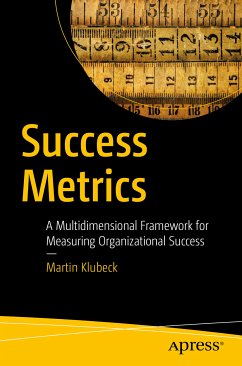To measure success, leaders today are missing a key meta-analytic in their toolbox. In this book, metrics consultant Martin Klubeck provides it to them. Success Metrics shows organizational leaders how to measure success at the individual and organizational levels. By measuring success in multiple dimensions using multivariatemethods you will be able to determine what works and what doesn't. The key is to measure and promote progress in terms of organizational vision, mission, and overarching goals.
Business leaders too often succumb to the working assumption that they only have to show shareholders and boards of trustees that they are turning a profit-the higher the profit, the more successful their stewardship of the company. Wrong! To truly thrive and endure, all organizations-corporate, government, small, large, nonprofit, or startup-need to define and pursue the underlying purpose for their existence.
The author's integrated measures of success can be used to communicate organizational progress to stakeholders, shareholders, boards of trustees, corporate leaders, the workforce, and the customer base and thereby galvanize broad commitment to organizational success. Klubeck shows how his principles and methods of measuring overall success can be applied at all levels: individual, team, group, department, division, and organization.
- Why you should measure success instead of performance
- What to measure and what not to measure
- How to integrate the measures of success to tell a complete story
- How to share measures of success with different audiences
Dieser Download kann aus rechtlichen Gründen nur mit Rechnungsadresse in A, B, BG, CY, CZ, D, DK, EW, E, FIN, F, GR, HR, H, IRL, I, LT, L, LR, M, NL, PL, P, R, S, SLO, SK ausgeliefert werden.
Hinweis: Dieser Artikel kann nur an eine deutsche Lieferadresse ausgeliefert werden.









